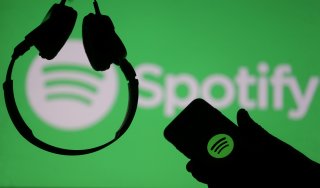Spotify Is Building an Anti-Plagiarism Artificial Intelligence
The Spotify software, if implemented, would catch whether elements of songs, such as the chord sequence, melodic fragments, harmony, match those of existing music, in a process that would take place in near real-time.
This week, the timelines of many social media users are full of their annual reports from Spotify, stating which songs and artists they listened to most often in 2020. This was enough to get the names of multiple artists, including Taylor Swift, trending on Twitter Tuesday.
But this week, there’s some other news from the music streaming giant. The website Music Business Worldwide noticed a filing for a patent this week for “Plagiarism Risk Detector And Interface,” which will discover “methods, systems and computer program products . . . for testing a lead sheet for plagiarism.”
It’s an extremely common occurrence in the music business for the writers of popular songs to be sued for plagiarism, by artists claiming they came up with the song first. In 2015, Robin Thicke and Pharrell Williams lost a lawsuit over their hit Blurred Lines, and were ordered by a jury to pay more than $7 million to the estate of Marvin Gaye.
The Spotify software, if implemented, would catch whether elements of songs, such as the “chord sequence, melodic fragments, harmony,” match those of existing music, in a process that would take place “in near real-time.”
Spotify describes the tool as “a graphical user interface (GUI) that is more intuitive, more precise as to the portion of the work that may be considered plagiaristic, and that provides dynamic visual feedback in substantially real-time.”
The patent, which was filed in Europe, has just now been approved, indicating that its actual implementation in Spotify’s algorithms is probably a ways away. But the technology is already controversial.
“They should use AI to invent technology that pays artists fairly,” one Twitter user said. Another speculated that the new tool would “single handedly cause the sample scene to flock to bandcamp.”
Back in September Spotify, which competes directly with Apple’s music streaming service Apple Music, issued a statement objecting to Apple’s announcement of a new Apple One bundle for its different services.
“Once again, Apple is using its dominant position and unfair practices to disadvantage competitors and deprive consumers by favoring its own services,” Spotify told the media following Apple’s September event. “We call on competition authorities to act urgently to restrict Apple’s anti-competitive behavior, which if left unchecked, will cause irreparable harm to the developer community and threaten our collective freedoms to listen, learn, create, and connect.”
Spotify, throughout the year, has been moving further into the podcasting world, in an attempt to diversify beyond merely music streaming. The company reached an exclusive deal to carry “The Joe Rogan Experience” podcast, while also paying nearly $200 million in February for the Ringer, Bill Simmons’s podcast-heavy media company. Spotify also was reportedly looking to launch a subscription podcast service, according to a report by The Verge in November.
Stephen Silver, a technology writer for The National Interest, is a journalist, essayist and film critic, who is also a contributor to Philly Voice, Philadelphia Weekly, the Jewish Telegraphic Agency, Living Life Fearless, Backstage magazine, Broad Street Review and Splice Today. The co-founder of the Philadelphia Film Critics Circle, Stephen lives in suburban Philadelphia with his wife and two sons. Follow him on Twitter at @StephenSilver.
Image: Reuters

